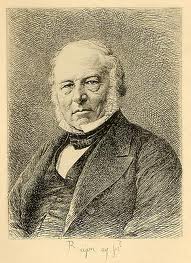I bet you have never heard of Rowland Hill. Like so many important reformers, Mr. Hill has faded into partial obscurity and only those interested in 19th century English history will have run into his name. But it is a prestigious name and one worth knowing. Hill was a teacher, inventor, and social reformer who was born in 1795 and died in 1879. Hill's father, Thomas Wright Hill, was an educator from Worcestershire and was a personal friend of Joseph Priestly, Thomas Paine, and Richard Price. As an educator Rowland Hill set up his own school in Birmingham which gained international fame. Hill was one of the first major educators to insist that encouragement and gentleness in education was not only more humane but also would, in the long run, be more efficacious.
Hill was obsessed by the shortcomings in the English postal system and he spent years attempting to create a model for reform of the system. Hill understood two central shortcomings of the post. Most importantly, he thought that it was far too expensive and inefficient both for the personal interests of British People and for the interests of the British economy. Before Hill's reforms many of the letters that were sent in England went by so-called 'franks' which was essentially a system of free postage used by MPs, Lords, and other government officials. Letters were so expensive to send that fraud was widespread and people would even resort to sending c.o.d. letters to loved ones with nothing in them, after which the loved one would refuse delivery, in a kind of system of secret message letting people know all was well. Hill understood that the difficulty that people experienced in contacting family members was not only a major emotional hardship but it made them reluctant to travel, lest they lose contact with loved ones. Hill also understood that not only were the franks costing the government money and resources, but exorbitant postal costs were standing in the way of business.
As they always are, the Tories were reactionary and shortsighted and under Prime Ministers Peel and Wellington, Hill's plans were resisted and attacked. But with the help of Melbourne (and eventually Lord John Russell) Hill's plans for an inexpensive, nationally organized postal system with one penny stamps was adopted. Russell made Hill the Secretary of the Post Office and he was knighted in turn. Perhaps most significantly, Hill is usually credited with the invention of the postage stamp. Though it took many years after Hill's plans were enacted for the Post Office to begin to make as much revenue as they had before, Hill's plans modernized the Postal System and not only helped individuals but actually helped modernize the British economy.
Like most reformers, Hill was attacked at every turn by myopic conservatives who cared nothing for people or for more generalized prosperity, but only cared for their own power and privilege. But Hill would not be turned aside and his determination should be celebrated and admired. Twenty years from now when our education system is defunct, our economy is entirely owned by foreign corporations, there are few or no family farms left, there is no public pensions system, remember the determination of Rowland Hill. We are going to need a dose of it ourselves.
Katalog Dapur Aqiqah
1 year ago

1 comment:
Conservatism and the economy are just masks they wear to say they've weighed the matter on the merits, using a values system at least moderately acceptable to the average citizen. They're really after power, control, and personal privilege.
Post a Comment